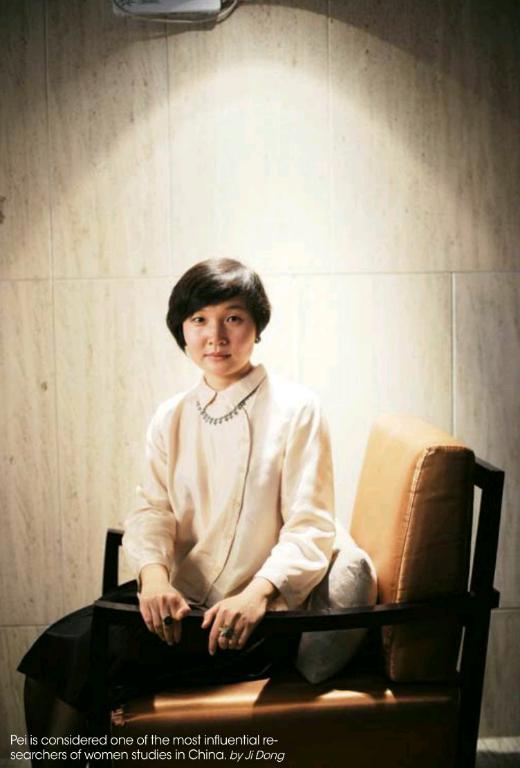Feminine Fulfillment
2014-02-25byZoeZhao
by+Zoe+Zhao
Pei Yuxin is frequently addressed as “Doctor Pei,” not only due to her doctorate of philosophy from the Department of Social Work and Administration of the University of Hong Kong, but also because she is a noted“sexpert” who focuses on contemporary Chinese women. Born in 1970, Pei now works at Guangzhou-based Sun Yat-sen University as an assistant sociology professor. She is considered by Chinese media to be one of the most influential researchers on women studies along with Li Yinhe and Ai Xiaoming.
Her choice of research is a theme most Chinese feel embarrassed to talk about in public places: sex. She once offered a 10,000-yuan cash prize for female masturbation videos and participation in masturbation research, creating a buzz across the nation. She claimed that she could shed new light on Chinese society through reasearching sexual behavior. In 2013, she published Sex and the City: A Study of Shanghai Young Women Born in the 1970s. The book recounts the life stories of more than 40 women living in Shanghai, who hailed from varying backgrounds, occupations, and living conditions, but were born in the 1970s. The book contains abundant rarely-seen first-hand information about sexual experience of young Chinese women.
In traditional Chinese culture, even mentioning sex in public is already indecent. In the 1980s, however, the social atmosphere began to change. After arrival of the internet, Chinese attitude towards sex gradually underwent revolution. Nowadays, as long as they arent especially devious in terms of social ethics and laws, various attitudes towards sex and sexual behavior are likely to be considered personal choices. However, such privileges are primarily reserved for men, and society affords much less tolerance for women.
This situation caused Pei to begin paying so much attention to Chinese women. She not only cares about individuals, but attaches importance to analyzing various female choices and the relationship between personal choice and contemporary Chinese society, using sociological theory and methods. She placed special focus on Chinese women born in the 1970s, a generation that matured in the wake of the countrys implementation of reform and opening-up in 1978. In some ways, these girls personal choices are troubled, embodying openness and conservatism at the same time.
She summarizes changes in female Chinese attitude towards sex after the country introduced reform and opening-up. In the 1980s, premarital sex was accepted by some, but only if the woman intended to marry the man. In the 1990s, premarital sex became more common. During this period, sexual relationships didnt necessarily lead to marriage. However, the idea that “a woman should love only one man” was still popular, and some began admitting that“true love” was sometimes not necessarily found in marriage. In the new millennium, premarital cohabitation has become more accepted. Many young women no longer attach so much personal worth to virginity.
Due to the ease with which sex as a research topic can be sensationalized, Pei emphasizes depth and authenticity. All her studies are qualitative, and gleaned from interviews and small workshops. To conduct her research on Shanghai women born in the 1970s, she hosted one-on-one interviews with 40 women. She also interviewed nearly 100 sexually active women with more than one sexual partner in major Chinese cities such as Beijing, Shanghai, Hong Kong and Guangzhou.
China Pictorial (CP): Why did you choose sex as your perspective on women studies?
Pei Yuxin (Pei): Sex is a sensitive issue in our society, and also a peripheral topic of social studies. However, it is a topic which involves everyone – an issue of great importance. In terms of existing studies on women, topics related to sex are peripheral and scarce. Just because most Chinese people avoid talking about sex and dont know how to talk about it, I think there are many unknown areas worth exploring and more breakthroughs to be found.
Since the countrys implementation of reform and opening-up, Chinese womens attitudes towards sex have changed gradually. Today, most Chinese women born in the 1980s and 1990s no longer rank virginity as the most important female trait and dont “hymen worship,” to put it in another way. Thats a major breakthrough itself.
CP: Chinese women born in the 1970s received important focus in your studies. What are the major differences in terms of attitude and understandings of sex between them and women in the West?
Pei: First, I think contemporary Chinese women value the establishment of a close relationship and communication in a sexual relationship. Men take the lead in sex. Women from Western countries tend to take a more active role in sexual activity. Second, sex-related commentaries from Chinese women born in the 1970s are largely based on personal experience. For example, if they know someone has a one-night stand or cheats, they often judge the situation with phrases such as“I would never do such things” or “Its no big deal. Anyone could do it.” In my opinion, women from Western countries care more about the reasons others make such choices. Third, Chinese women born in the 1970s still treat sex as a tool or a basic factor to establish a close relationship. Few deem sex an independent and enjoyable activity. However, many of their Western counterparts sometimes seek sex for experience only.
CP: You mentioned in another interview that the phenomenon of multiple sexual partners in marriage in China is more common than that in the Western countries. Why?
Pei: First I think many Chinese actually have few sexual partners or dont even know about sex before marriage. After they marry, they realize they arent compatible with their spouses. But considering many other factors, they are reluctant to divorce. Thus, some of them develop extramarital sexual relationships. Besides, China lacks culture of marriage counseling or therapy, while Western people can turn to professionals for help related to sex and marriage. Moreover, women face much less pressure in Western countries if they get divorced. Laws protect divorced women in many ways. However, the situation is different in China. This motivates some women to stay in marriage and treat the situation in other ways.
CP: As a feminist, what kind of help or guidance do you hope your studies can offer Chinese women?
Pei: I hope my research helps more women recognize their uniqueness. I want their understandings of themselves not to rely only on male criteria or their relationships with men. And I hope to fight for womens rights in their disadvantaged place. But more concretely, I hope women can acquire their own understandings of themselves, their bodies, their relationships with their partner, and sex. They will treat themselves better and at the same time, change our society.
